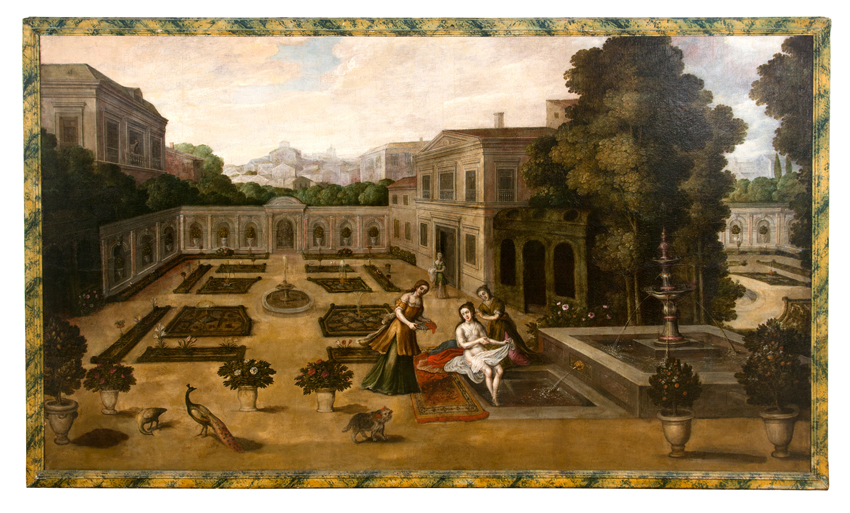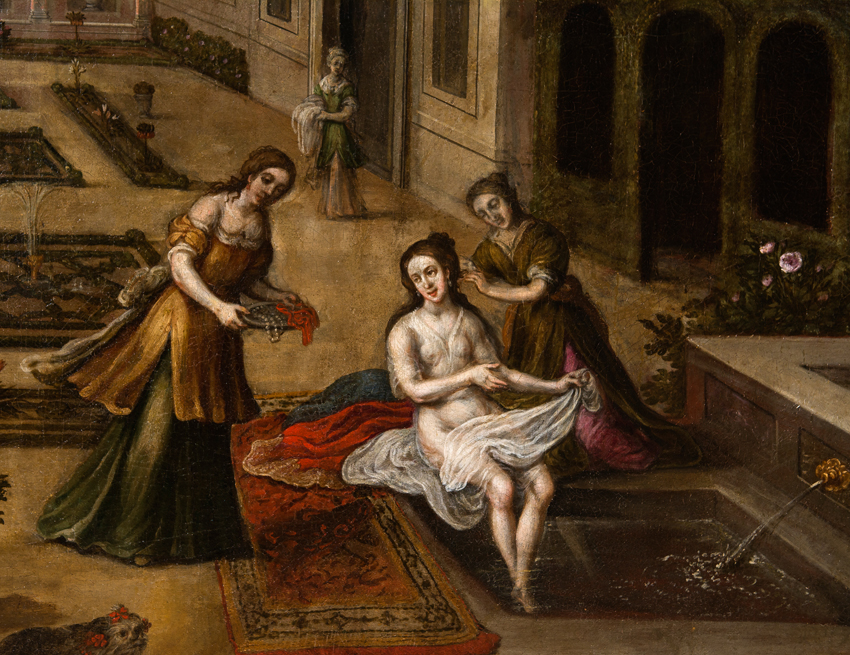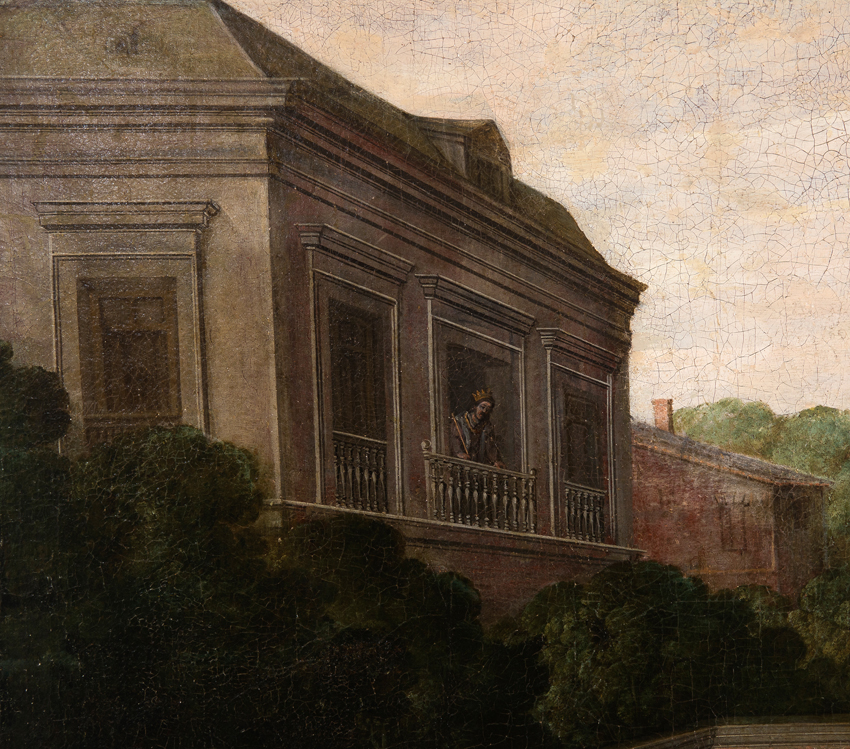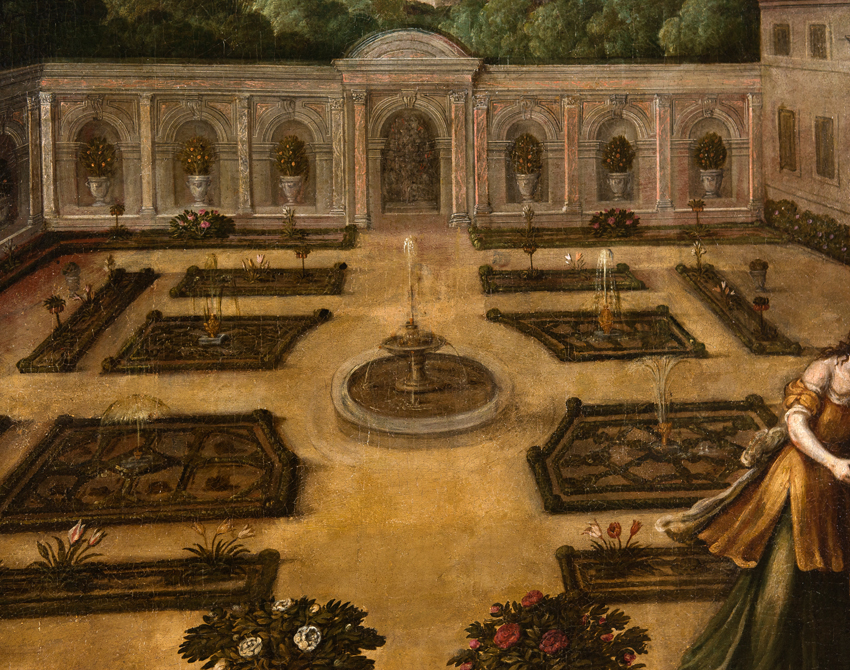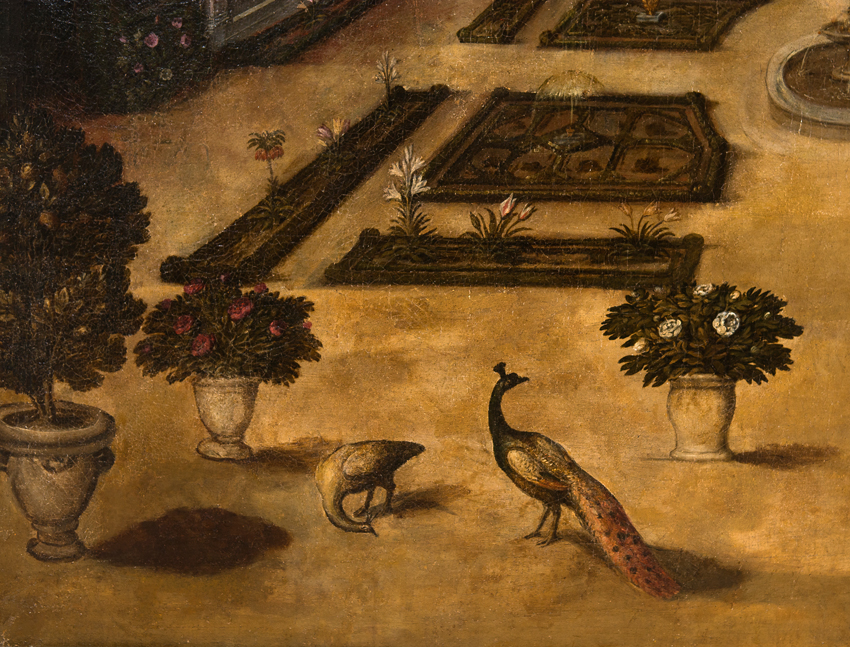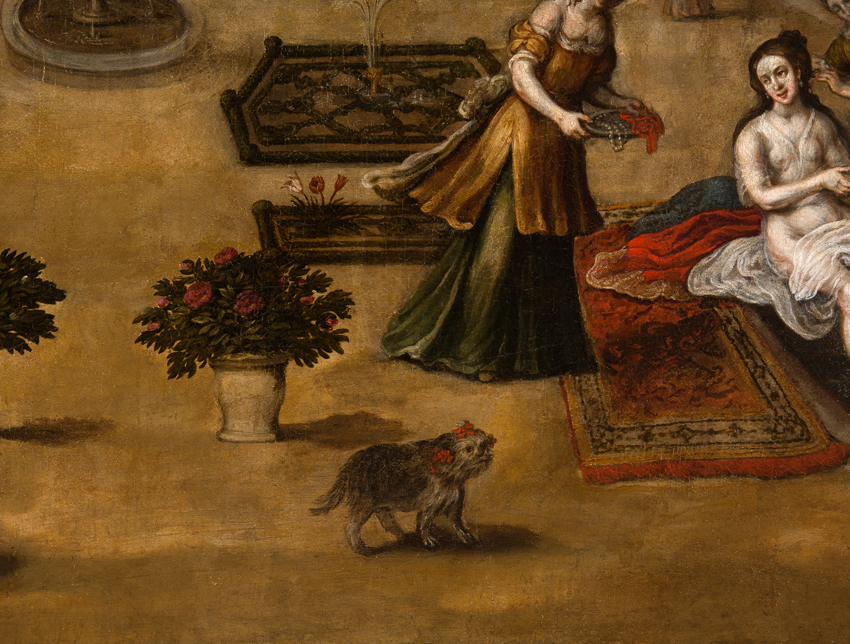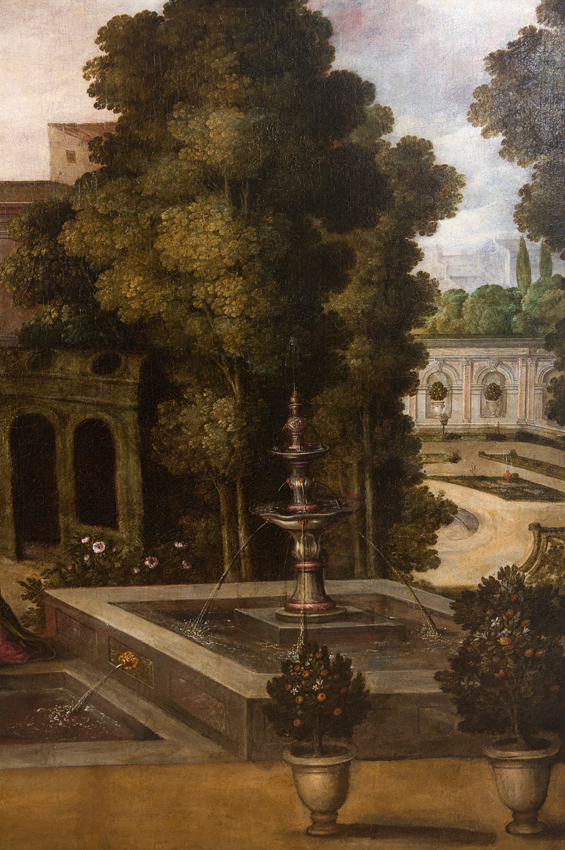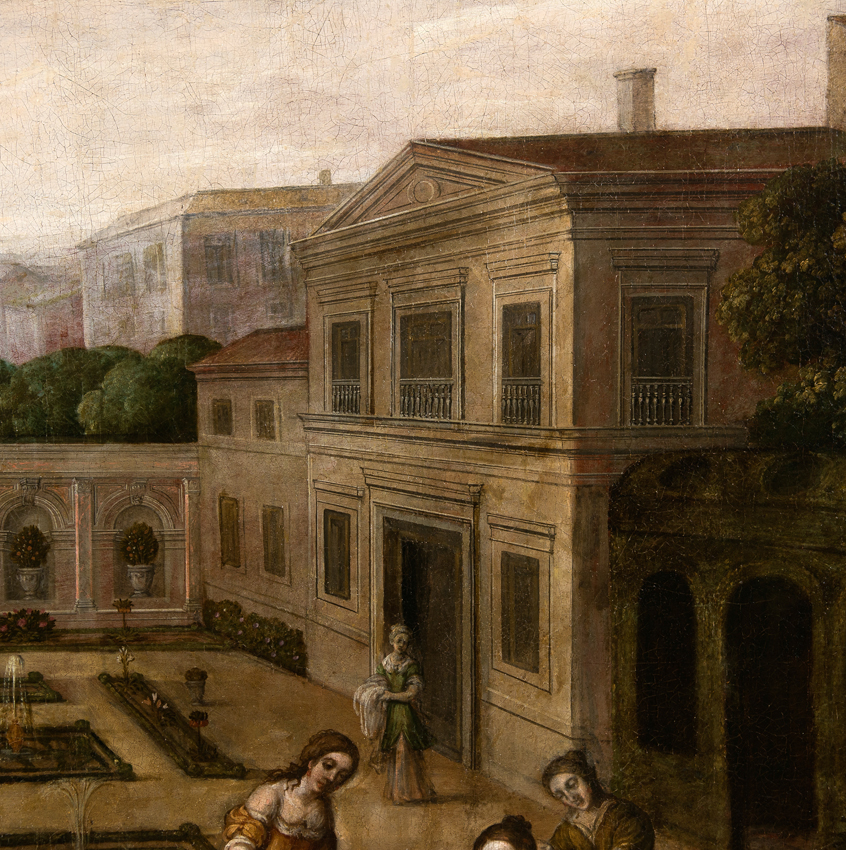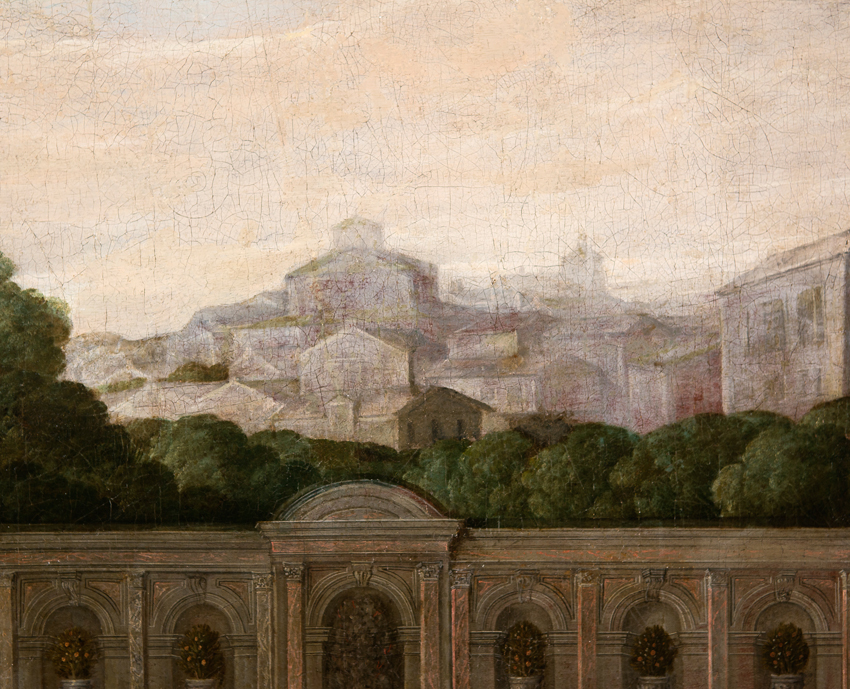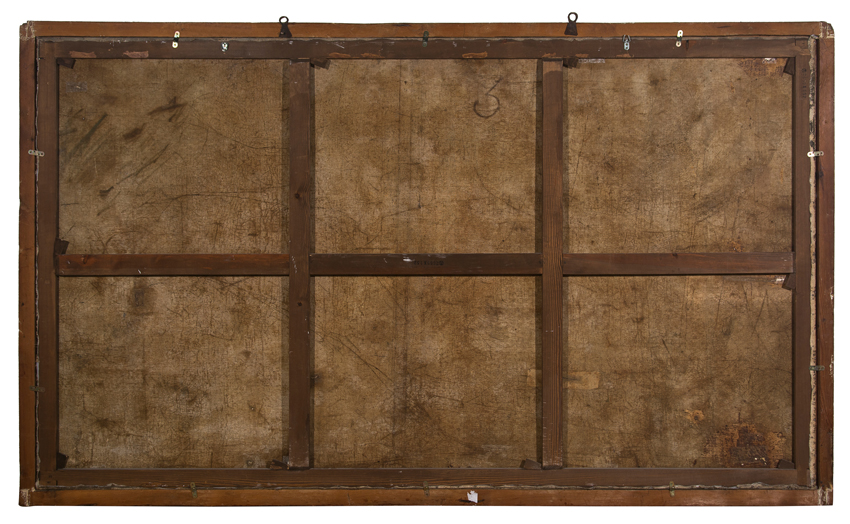16
Juan de la Corte (Antwerp, circa 1585 - Madrid, 1662)
In Millésime 24
Juan de la Corte (Antwerp, circa 1585 - Madrid, 1662)
"David and Bathsheba"
Oil on canvas. 152.2 x 189 cm.
Published in the catalogue of the exhibition "Imágenes de un siglo. Luces del barroco. Pintura española del siglo XVII"(Images of a Century. Lights of the Baroque. Spanish Painting of the 17th Century), which took place at the University of Salamanca in 2006.
Born in Antwerp, a fact which is documented in his will, Juan de la Corte probably trained in Flanders but developed his career mainly in Spain, especially at the Court in Madrid. As indicated in the exhibition catalogue: "His activity for the Crown of Spain, which continued from 1615, focused mainly on the Buen Retiro Palace, for which he made more than 50 paintings, of which almost all are lost according to the royal inventories."
Regarding his favourite themes, Juan de la Corte himself, as reported by the Prado, confessed that he "focused on 'architecture, battles, and countries,' genres in which he was highly valued by his contemporaries." Specifically, the "proliferation of architectural perspectives" is a prominent aspect of his work, which can be seen by taking a visual stroll through the artwork we have here.
It is interesting to note that, as the catalogue states, the biblical and historical paintings of Juan de la Corte generally form part of series, some of which have King David as the protagonist, one of the most iconographically rich characters of the Old Testament, as in the case of this painting.
In the same collection as this painting, there is another signed by Juan de la Corte depicting David defeating Goliath, and the same subject is developed in another canvas, dated 1639, that is in a private collection. In their catalogue of the artist's work, Ángulo and Pérez Sánchez also recorded a depiction of David and Bathsheba on the throne which was in the Buen Retiro and would also have been part of a series dedicated to the biblical king.
As they continue to describe in the aforementioned catalogue:
"The scene we see here shows the moment when David observes Bathsheba, the wife of General Uriah, bathing in the garden as narrated in the Book of Kings (11.11,2-5). David fell in love with her and ordered her husband to fight in the most dangerous place on the battlefield, thus making sure he was killed. The prophet Nathan later reproached the king for his adultery, telling him that he would not escape the wrath of God, even if he repented. Generally, the scene takes place outdoors, in a garden where Bathsheba washes her feet in a basin or pool while being attended to by her maidservants. In this depiction, Juan de la Corte adheres to the conventional iconographic model, although he undoubtedly distinguishes himself from most Spanish painters of his time by portraying Bathsheba almost naked, covered by veils or semi-transparent cloths. One of her maidservants combs her long hair, and another brings her a tray with a pearl necklace, while from one of the windows of his palace, on the left, King David attentively observes the scene.
In the case of this painting, the architecture and landscape in which the painter has placed the scene is also remarkable, giving us the chance to appreciate a good example of a Spanish garden from that time.
Juan de la Corte tended to frame his scenes in architectural backgrounds, frequently taken from prints by artists such as Vredeman de Vries and Cornelis Galle. Examples of the former served as models for his garden scenes."
Bibliographical references:
- "Imágenes de un siglo. Luces del barroco. Pintura española del siglo XVII". Salamanca, 2006.
- Museo del Prado. (s.f.). "Corte, Juan de la". https://www.museodelprado.es/aprende/enciclopedia/voz/corte-juan-de-la/4236322c-50b0-4cfa-aa66-36a16bb44dda
Juan de la Corte (Antwerp, circa 1585 - Madrid, 1662)
"David and Bathsheba"
Oil on canvas. 152.2 x 189 cm.
Published in the catalogue of the exhibition "Imágenes de un siglo. Luces del barroco. Pintura española del siglo XVII"(Images of a Century. Lights of the Baroque. Spanish Painting of the 17th Century), which took place at the University of Salamanca in 2006.
Born in Antwerp, a fact which is documented in his will, Juan de la Corte probably trained in Flanders but developed his career mainly in Spain, especially at the Court in Madrid. As indicated in the exhibition catalogue: "His activity for the Crown of Spain, which continued from 1615, focused mainly on the Buen Retiro Palace, for which he made more than 50 paintings, of which almost all are lost according to the royal inventories."
Regarding his favourite themes, Juan de la Corte himself, as reported by the Prado, confessed that he "focused on 'architecture, battles, and countries,' genres in which he was highly valued by his contemporaries." Specifically, the "proliferation of architectural perspectives" is a prominent aspect of his work, which can be seen by taking a visual stroll through the artwork we have here.
It is interesting to note that, as the catalogue states, the biblical and historical paintings of Juan de la Corte generally form part of series, some of which have King David as the protagonist, one of the most iconographically rich characters of the Old Testament, as in the case of this painting.
In the same collection as this painting, there is another signed by Juan de la Corte depicting David defeating Goliath, and the same subject is developed in another canvas, dated 1639, that is in a private collection. In their catalogue of the artist's work, Ángulo and Pérez Sánchez also recorded a depiction of David and Bathsheba on the throne which was in the Buen Retiro and would also have been part of a series dedicated to the biblical king.
As they continue to describe in the aforementioned catalogue:
"The scene we see here shows the moment when David observes Bathsheba, the wife of General Uriah, bathing in the garden as narrated in the Book of Kings (11.11,2-5). David fell in love with her and ordered her husband to fight in the most dangerous place on the battlefield, thus making sure he was killed. The prophet Nathan later reproached the king for his adultery, telling him that he would not escape the wrath of God, even if he repented. Generally, the scene takes place outdoors, in a garden where Bathsheba washes her feet in a basin or pool while being attended to by her maidservants. In this depiction, Juan de la Corte adheres to the conventional iconographic model, although he undoubtedly distinguishes himself from most Spanish painters of his time by portraying Bathsheba almost naked, covered by veils or semi-transparent cloths. One of her maidservants combs her long hair, and another brings her a tray with a pearl necklace, while from one of the windows of his palace, on the left, King David attentively observes the scene.
In the case of this painting, the architecture and landscape in which the painter has placed the scene is also remarkable, giving us the chance to appreciate a good example of a Spanish garden from that time.
Juan de la Corte tended to frame his scenes in architectural backgrounds, frequently taken from prints by artists such as Vredeman de Vries and Cornelis Galle. Examples of the former served as models for his garden scenes."
Bibliographical references:
- "Imágenes de un siglo. Luces del barroco. Pintura española del siglo XVII". Salamanca, 2006.
- Museo del Prado. (s.f.). "Corte, Juan de la". https://www.museodelprado.es/aprende/enciclopedia/voz/corte-juan-de-la/4236322c-50b0-4cfa-aa66-36a16bb44dda
Millésime 24
Sale Date(s)
Venue Address
General delivery information available from the auctioneer
The purchase price includes the delivery of the lots in the venue of the auction. Transporting to other destinations is at the own risk of the client. The customer must contact "LST", to give the corresponding instructions for such transporting. "LST" is not responsible for the packaging or any accident incurred during transportation.
Important Information
Once again, we start the year with a special auction, called Millésime.
A catalog of 73 lots of European, Novo-Hispanic and Vicerregal art, so spanish americas art, where you will find paintings, furniture, decorative arts etc.
We hope you enjoy it!!
Terms & Conditions
CONDITIONS OF THE AUCTION:
I. REGISTRATION. To bid in the room customers must register at the beginning, filling out a form and picking a number that will identify them during the auction. Customers may be required to register in bank references or other guarantee system and if they do not prove the solvency "LST" will not accept bids and award the auction.
II. WRITTEN BIDS. "LST" will accept written bids, which will be formalized in the form provided by the room until the day before the auction. In such auctions, the room will bid in name of the client until the maximum stated in the offer and always at the lowest possible price. If there are two or more bids for the same amount, the one placed first will have the priority. Written bids received in advance, will have priority on the day of the auction.
III. TELEPHONE BIDS. "LST" will allow telephone bids, if interested people contact "LST" days before the auction providing personal data, ID card and the phone number which will be used by the staff of "LST" to call at the time of the auction. The buyer, within all the legal rights is making an offer for the asking price, when applies for telephone bid. "LST" will not take responsibility for any technical defects beyond its control, which may prevent to contact successfully the bidder during the auction.
IV. AUCTIONEER. The auction will be conducted by an auctioneer, director of the auction will be judge and arbitrator of it with full authority in its development, will award the lots to the highest bidder and is able to settle any controversy concerning lots sale, reject bids, divide lots or group them and remover objects from the room. Will be able to, if it is deemed suitable, not accept bids on the auction. His decision will be unappealable.
V. SALE OF LOTS. The lots are awarded to the highest bidder. Once the auctioneer blows the hammer, the buyer becomes responsible of the lot purchased, exempting "LST" of liability to for any damage and / or accidents that may occur. No refunds of lots.
VI. STARTING PRICE. The amount shown in the catalogue as the starting price for each lot will be, as a rule, the minimum selling price, except for exceptional cases where a reservation may be agreed upon with the seller or it set discretionary by the room.
VII. SCALE OF BIDS. The bids are set according to the following scale:
From 50.-€ to 200.-€…………………………………………..at 10.-€
From 200.-€ to 500.-€…………………………………… …25 in 25.-€
From 500.-€ to 1.000.-€………………………………..…..….50 in 50.-€
From 1.000.-€ to 2.000.-€………………………………..…100 in 100.-€
From 2.000.-€ to 5.000.-€……………………………….….250 in 250.-€
From 5.000.-€ to 10.000.-€…………………………………500 in 500.-€
From 10.000.-€ to 20.000.-€……………………………1.000 in 1.000.-€
From 20.000.-€ to 50.000.-€……………………………2.500 in 2.500.-€
From 50.000.-€ to 100.000.-€…………………………..5.000 in 5.000.-€
From 100.000.-€ to 100.000.-€………………………10.000 in 10.000.-€
From 200.000.-€ to 200.000.-€………………………25.000 in 25.000.-€
From 500.000.-€ to 500.000.-€………………………50.000 in 50.000.-€
VIII. RIGHT OF ADMISION. "LST" reserves the right to admission to the auction room and to reject, at its judgment, any purchase order, from clients whose solvency is not duly proved as well as not to sale auctions.
IX. SALE PRICES. The successful bidder of one or more lots must pay "LST" the final sale price achieves at auction, plus the 24,5 % plus 21% VAT on the commission.
X. CATALOG DATA. The catalogue data are obtained in order to careful research and advice, however, any responsibility is afforded about its accuracy. The lots will be auctioned in the state in which they are, not accepting any claims in restorations, breakage, damage, imperfections and, even description or numbering mistakes in the catalogue, in case of it, being the burden of the buyers to make sure before the auction that the description matches with their personal opinion about respective lot. The exhibition of the lots is intended to allow a perfect review and study of them.
XI. PAYMENT AND REMOVAL OF LOTS. Payment and removal of the lots will be held no later than five days following the auction. After this period expire without having the buyer removed the lot or lots purchases, it will accrue an expense of custody of 6 euros per day on each lot.
15 days after the auction without having the buyer paid and removes the sold lots, "LST" will inform the seller and there will begin judicial proceeding in order to obtain payment. The delay in payment by the purchaser of his/her sold lots will carry an interest increase at a rate of 1,5% per month.
XII. DELIVERY OF LOTS. The purchase price includes the delivery of the lots in the venue of the auction. Transporting to other destinations is at the own risk of the client. The customer must contact "LST", to give the corresponding instructions for such transporting. "LST" is not responsible for the packaging or any accident incurred during transportation.
XIII. RIGHT OF FIRT REFUSAL AND REPURCHASE. "LST" in order to article 38 of "Ley 16/1985 de 25 Junio del Patrimonio Histórico Español" (BOE. 155 June 29, 1985), will notify in advance to the Ministry of Culture, the content of their catalogues. Concerning the lots subject to the legislation referred to in the preceding paragraph, the Administration may exercise the rights of first refusal and repurchase according to the law. "LST" will watch over the protection of Artistic, Historical and Bibliographical Heritage of Spain. For customers out of European Community, a tax for export is required by the Administration.
XIV. VALUE ADDED TAX (I.V.A). This tax will be accrued on commissions of "LST" for buyers, using the rates prevailing on the date of the auction.
XV. DATA PROTECTION. In order to the "Ley 15/1999 de 13 de Diciembre, de Protección de Datos de Carácter Personal", the client authorize "LST", the inclusion of their data in a customer file, and for the promotion by "LST" of the objects at all times the rights of access, rectification or deletion of personal data by sending the appropriate request to the following address: LA SUITE SUBASTAS, C/ Conde Salvatierra, 8, 08006. Barcelona.
XVI. EXPRESS LEGAL JURISDICTION. These Conditions are governed by and interpreted in accordance with the rules of Spanish law. The mere act of participating in the auction as seller, buyer or bidder, implies acceptance of these Terms and Conditions.
Sales operations are understood to be held at the registered office of "LST", C/ Conde de Salvatierra, 8, 08006. Any dispute shall be taken to the competent courts of Barcelona, expressly waiving any other jurisdiction, in accordance with Article 55 of the "Ley de Enjuiciamiento Civil".





















